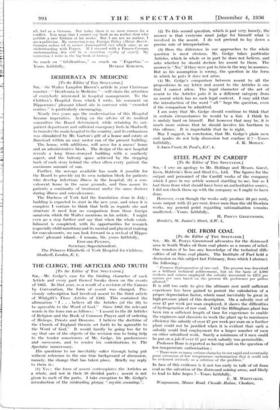THE CLERGY, THE ARTICLES AND TRUTH
[To the Editor of THE SPECTATOR.] SIR,—Mr. Gedge's case for the binding character of each Article and every part thereof breaks down on the events of 1865. In that year, as a result of a revision of the Canons by Convocation, the form of assent was changed. Pre- viously subscription had involved assent to the third article of Whitgift's Three Articles of 1583. This contained the affirmation " I . . . believe all the Articles (of the 39) to be agreeable to the Word of God." Since' 1865 the relevaht words in the form run as follows : " I assent to the 39 Articles of Religion and the Book of Common Prayer and of ordering of Bishops, Priests and Deacons: I believe the - doctrine of the Church of -England therein set forth to be-agreeable to the Word of God." It would hardly be going- too far to say that one of the objects of the revision was to bring help to the tender consciences of Mr. Gedge, . his predecessors and successors,- and. to render his contributions to The Spectator unnecessary. , His questions to me inevitably suffer through being OA without reference to the one .true -background of discussion, namely, the change that has taken place. Briefly my reply to them is :
(1) Yes ; the form of assent contemplates the Articles as a whole, and not in their 39 divided parts ; assent is not given to each of the parts. I take exception to Mr. Gedge's introduction of the misleading .pinuse (2) To this second question, which is put very loosely, the answer is that everyone must judge for himself what is involved in the assent. I do not pretend to lay down a precise rule of interpretation.
(3) Here the difference in our approaches to the whole question is most obvious. Mr. Gedge takes particular Articles, which in whole or in part he does not believe, and asks whether he should declare his assent to them. The answer is No," if they were put to him in the way he assumes. But as his assumption is wrong, the question in the form in which he puts it does not arise.
(4) Mr. Gedge's comparison between assent to all the propositions in my letter and assent to the Articles is one that I cannot allow. The legal character of the act of assent to the Articles puts it in a different category from an assent which has no such legal context. I may add that the introduction of the word " all " begs the question, even if the comparison be admitted.
I am sorry that Mr. Gedge should continue to think that in certain circumstances he would be a liar. I think he is unduly hard on himself. But however that may be, it is much more serious that he should involve his brethren in this offence. It is improbable that he is right.
May I suggest, in conclusion, that Mr. Gedge's plain men and spades do not help discussion but confuse it ?—Yours
faithfully, J. K. MOZLEY. 3 Amen Court, St. Paul's, E.C. 4.




















































 Previous page
Previous page